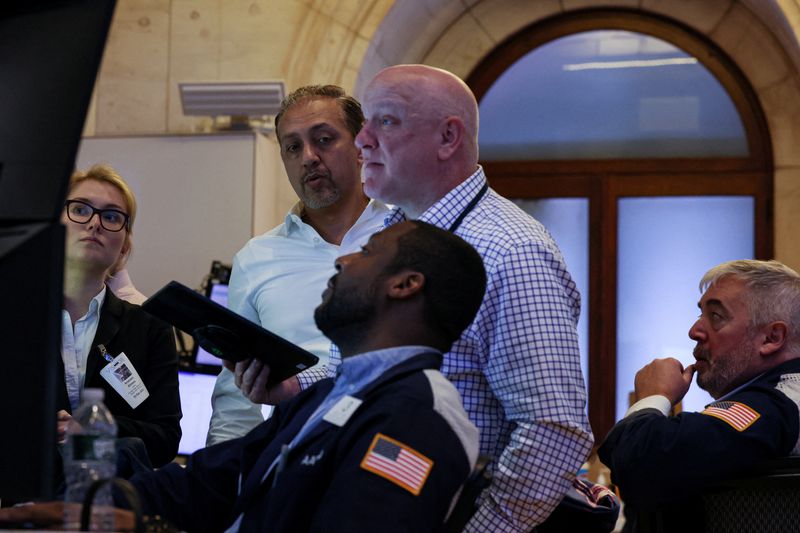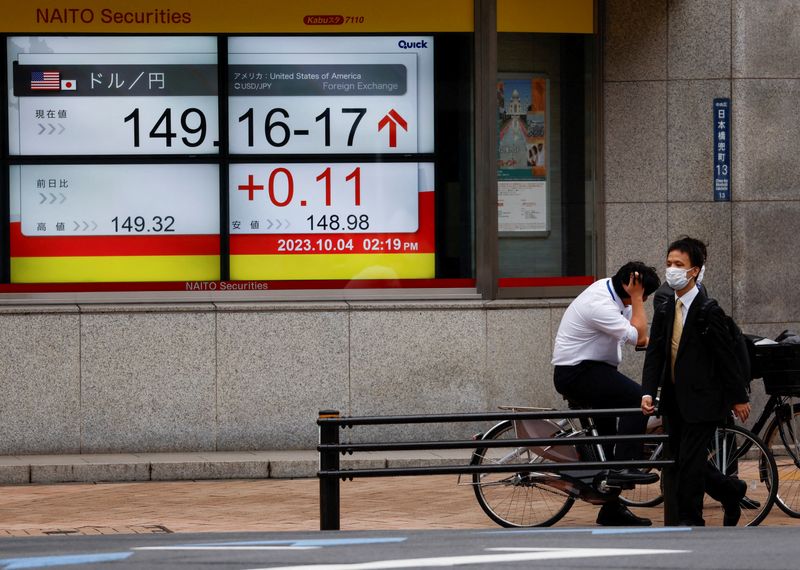By Koh Gui Qing and Ankur Banerjee
NEW YORK/SINGAPORE (Reuters) -Global stocks crept higher on Tuesday and the dollar lingered near a five-month low as investors held fast to bets that cooling U.S. inflation will lead the Federal Reserve to cut interest rates next year.
Oil prices jumped over 3% earlier in the session to the highest in almost a month, as Middle East strife continues and investor hope possible rate cuts will boost global economic growth and fuel demand.
Trading was thin on the day after Christmas with several markets, including those in Australia, Hong Kong, Britain and Germany, closed for Boxing Day.
MSCI's gauge of stocks across the globe gained 0.39%. On Wall Street, the Dow Jones Industrial Average rose 0.43%, the S&P 500 gained 0.42%, and the Nasdaq Composite added 0.54%.
In a sign the U.S. economy was holding up, a report by Mastercard (NYSE:MA) on Tuesday showed U.S. retail sales rose 3.1% between Nov. 1 and Dec. 24, lower than last year's 7.6% gain.
"Consumers are still spending, but they're still price conscious and want to stretch their budgets," said Arun Sundaram, an analyst at CRFA Research.
The yield on 10-year Treasury notes was down a touch at 3.895%, while the two-year U.S. Treasury yield was up 1.8 basis points at 4.3584%. [US/]
U.S. crude trimmed earlier gains to finish up 2.1% at $75.12 per barrel and Brent was at $80.66, up 2.01% on the day. [O/R]
The dollar index slipped 0.17% to 101.47, a hair's breadth from a five-month low of 101.42 struck on Friday. A soft dollar helped to lift the euro up 0.3% to $1.104. [USD/]
Investors were still digesting data released on Friday that showed U.S. prices fell in November for the first time in more than 3-1/2 years, underscoring the economy's durability.
Inflation, as measured by the personal consumption expenditures (PCE) price index, fell 0.1% last month.
"In a way, markets could not have asked for better news from the continued easing of the core PCE deflator in November," said Nicholas Chia, Asia macro strategist at Standard Chartered (LON:STAN).
"Thin liquidity conditions are likely to exacerbate the so-called 'Santa Claus rally' in equities ahead of the turn of the year," Chia added.
The end of the year tends to be a strong period for stocks, a phenomenon dubbed the "Santa Claus Rally."
Stock investors have cheered recent signs from the Fed on the outlook for rates. At the conclusion of its policy meeting on Dec. 13 the Fed signalled it had reached the end of its tightening cycle and opened the door to interest rate cuts in the coming year.
Markets are now pricing in a 75% chance of a 25 basis points rate cut from the Fed in March, according to the CME FedWatch tool, compared with a 21% chance at the end of November. Markets are also pricing in more than 150 basis points of rate cuts next year.
"The Federal Reserve has aggressively changed its rhetoric to engineer a significant easing of financial conditions," Citi analysts said in a note.
"A combination of slower core inflation and rising recession concerns led Fed officials to shift rhetoric away from a commitment to fight inflation with higher-for-longer rates and toward reassuring markets that they will not 'hang on' to higher rates for too long."
In Asia, China stocks fell 0.47%, weighed down by semiconductor shares, while gaming stocks stabilised after a slew of companies announced share buyback plans. Hong Kong's Hang Seng Index remained closed.
Japan's Nikkei gained 0.16% and remains the best performing major Asian stock market with a 27% rise in 2023.
The yen was flat versus the greenback at 142.47 per dollar, retracing some recent gains made on the prospect of the Bank of Japan soon ending its ultra-easy policy. [FRX/]

The Asian currency is up 4% this month, on course for a second straight month of gains against the dollar. But for the year, the yen remains down 7.8% against the greenback.
Spot gold added 0.7% to $2,067.19 an ounce, [GOL/] while Bitcoin fell 3.26% to $42,171.00.
